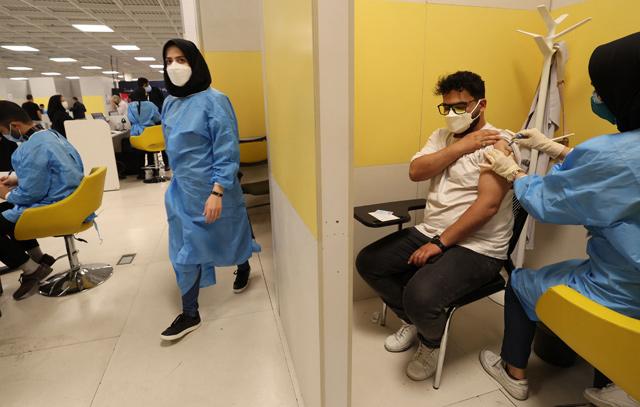- International News
- Sun-2021-08-15 | 04:08 pm

Nayrouz News Agency :
Iran on Saturday announced new curbs to combat the spread of COVID-19 as deaths and infections surge and as the country tries to speed up its vaccination campaign.
The Islamic republic is struggling to the contain what officials have called a "fifth wave” of the virus driven by the highly infectious Delta variant.
Hit by the Middle East’s deadliest outbreak, Iran has officially recorded more than 97,000 deaths and over 4.38 million infections, with numbers breaking daily records several times this month.
Health authorities acknowledge that the official figures underestimate the country’s real toll.
Iran’s national coronavirus taskforce announced Saturday that government offices, banks and non-essential businesses must close their doors countrywide from Monday until the end of next Saturday.
A ban on car travel between provinces will be in force from noon on Sunday (07:30 GMT) until August 27, taskforce spokesman Alireza Raisi told IRNA state news agency.
The new measures coincide with two Shiite religious commemorations set for next week, though authorities said the restrictions would not impact ceremonies held in the open air.
Iran has avoided imposing a full lockdown on its 83-million-strong population, instead resorting to piecemeal measures such as temporary travel bans and business closures.
Authorities have recently tried to speed up the country’s inoculation campaign amid criticism that it began too late and as Iran’s exhausted health system struggles to cope with rising case numbers.
A few thousand Iranians lined up on Saturday at a vaccination centre at Tehran’s sprawling Iran Mall, AFP journalists said.
"The vaccination pace is accelerating every day, thank God,” said Bahare Karimi, a health ministry representative at the vaccination centre, adding that health workers were "very tired now”.
She told AFP that the centre was currently distributing Sinopharm vaccines, but that the type of jab being administered might differ from day to day.
More than 14.7 million people have received a first vaccine dose, but only 3.8 million have received the required second jab, the health ministry said on Saturday.
As well as China’s Sinopharm, Iran is also administering Russia’s Sputnik V, India’s Bharat Biotech and the AstraZeneca/Oxford vaccines, according to the health ministry.
Authorities have approved the emergency use of two locally made vaccines, but the only mass-produced one, COVIran Barekat, is in short supply.
Pharmacy worker Hamed Rahmati complained as he waited in line for his jab.
"They didn’t [import vaccines] when they were supposed to and now it’s too late,” he said.
President Ebrahim Raisi said that Iran needed an addition 60 million vaccine doses to "control the unfavourable coronavirus situation”, according to the government’s website.
Raisi told a COVID-19 taskforce meeting on Saturday that 30 million doses would be imported and made available "in a short time”, without elaborating.
Choked by US sanctions that have made it difficult to transfer money abroad, Iran has said that it has struggled to import vaccines.
In January, supreme leader Ayatollah Ali Khamenei banned the use of jabs made by the United States and Britain, calling them "completely untrustworthy”.













